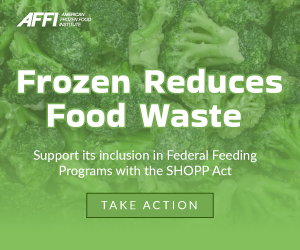By: Dr. Lory Reveil, Director of Scientific and Regulatory Affairs
Over the past five years, the American Frozen Food Institute (AFFI) has been at the forefront of advancing Listeria science and education, development of food safety manufacturing practices, and novel approaches targeting the prevention and control of Listeria monocytogenes (Lm).
Controlling the prevalence and persistence of Lm in food production environments has unique logistical constraints, regulatory barriers, and technical inadequacies. While improvements continue to occur across the food chain, achieving U.S. public health objectives defined by the U.S. Centers for Disease Control and Prevention’s (CDC) Healthy People 2030 Goals for Lm is likely to remain unattainable without a concerted effort by all stakeholders. The time has come for food manufacturers, policymakers, and technology innovators to rethink Listeria management strategies to reduce incidence of listeriosis across all food categories.
Developing Industry Best Food Safety Practices
Food safety professionals from across the frozen food industry converged in 2017 to build recommendations that serve as best industry practices to address risks associated with the presence of Lm in frozen food facilities. The Listeria Control Program© and resources were published online in 2019 and made accessible to the public on AFFI’s Food Safety Zone, in an easy to identify, download and implement format.
For example, industrial freezing equipment used in frozen food processing are extremely difficult to clean and sanitize routinely and effectively. AFFI’s freezer management recommendations provide industry best practices as shared by experts, but also leans on design principles that can be the basis for companies to make science-based investment decisions and alert freezer manufacturers towards more innovative equipment solutions.
Using Science to Inform and Advocate
Recognizing the need for a consistent global Lm policy and one that is solution-based and rooted in science (and goes beyond just frozen), AFFI convened a global panel of experts in 2019 from interdisciplinary fields such as food safety, epidemiology, food science, and risk assessment that resulted in a white paper (Farber et al, 2020) on alternate approaches to Listeria management for industry and regulatory entities.
The published work recommends a tolerance level for the presence of Lm in low-risk foods integrated with a risk-based finished-product verification program to both detect and enumerate the pathogen as an alternative to existing two-class presence/absence testing. The benefit of this approach is the ability to detect low level contamination that can trigger appropriate corrective action and to identify high level contamination that can be prevented from entering commerce. In fact, experts demonstrated that some three-class sampling plans possess higher test performance in detection of the pathogen such that it may serve as a “warning management indicator.”
Industry Education and Training
FSMA provides a strong foundation to make consequential changes in the industry but enhanced food safety awareness and knowledge among food safety professionals, operations personnel and management executives are critical to driving successful implementation. That’s why in 2020, AFFI released its “Listeria Stops Here” toolkit aimed at frontline operations personnel to build recognition for and understanding of the specific risk related to Lm in food production. Earlier this year, AFFI and the International Food Protection Training Institute (IFPTI) released their collaborative effort on Lm-specific training, the Listeria Control Specialist program, a certificate course to build the knowledge base needed in the industry among professional in all functions across the industry to tackle Lm and its prevalence in our food production systems. Adoption of these tools ensure industry builds both technical knowledge and an ethos of food safety culture across organizations.
What’s Next
Three fundamental areas hold the key to prevention and control of Lm in frozen food production: 1) a dedicated effort to manage sanitation in the post-lethality environment; 2) enhancing environmental monitoring programs to include sampling and testing of food contact surfaces; and 3) risk-based finished product sampling and testing to detect and enumerate the pathogen.
However, the current regulatory framework in the U.S. is not well-aligned with supporting these important changes. While the U.S. Food and Drug Administration’s (FDA) Food Safety Modernization Act (FSMA) is aimed at offering industry flexibility to implement risk-based approaches, regulatory enforcement on the other hand remains a largely hazard-based model.
Prevention and control of Lm in processing facilities is a comprehensive food safety management effort and minimizing the incidence of foodborne listeriosis is a multi-faceted, cross-functional, and diverse stakeholder public health endeavor. Enabling teams with the flexibility to prioritize food safety, investing in food safety training and knowledge to support decision making, and advancing organizational food safety culture are critical inputs in this process. At the same time, the food production system earnestly needs a risk-based and practical regulatory landscape that provides the flexibility to implement strategies that assure improved Lm prevention and control outcomes. AFFI shares the public health imperatives associated with Lm and stands ready to build on the scientific knowledge, engender needed technological advancements and progress industry’s commitment to food safety.




